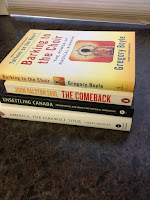I've surfaced after a 9 month silence, inspired by a Christmas Eve breakfast conversation related to the musical Cats and T. S. Eliot's poem, "The Naming of the Cats". Searching for the poem, I realize that I did a blog post on the subject five years ago. Here it is, a nostalgic retrospective. Because today I have time. Merry Christmas, everyone.
Names
None of the names is familiar to me. Although I took the time in the fifteen minutes before the oratory contest to write the names of the contestants on each of the adjudication sheets the other judges and I have in our packages, I can’t find the Smith-Jones* my fellow judge has assigned to first place. He has put Findley in second, and I can’t find that contestant, either. I can find Amanda, and Tom, and Chelsey, and Brandon, and Stephanie, though. I dig out my program from the pile of adjudication forms, and attempt to match the speakers’ first names to the last names I hear. Even in the first two minutes of our discussion to finalize winners in each of the categories, I am uncomfortable referring to people by their last name.
For my judging partner, a police officer, wielding last names seems natural and comfortable. The officer certainly means no disrespect. Before the contest began, he chatted with the young people in the audience. His genuine smile and evident interest in what they had to say established an easy rapport. So, why would using last names be so normal for him yet spur such a visceral reaction in me?
He might be used to it, I speculate. I would wager he remembers being called by his last name during his own training. At that point, I ask myself in what contexts individuals might be called by their last name. I come up with military and police recruits. Boarding schools. Sports teams. Professional athletes. Aristocratic men (Darcy, Bingley from Pride and Prejudice). Authors. As I have never been part of the military or the police, have never attended a boarding school or been part of a school sports team and definitely am not (yet) a professional athlete, a published novelist or a member of the aristocracy, calling people by their last names is foreign to me. It’s not how I do things.
 Throughout my career, I have always used first names. I knew my students and my colleagues as Brittany, Cindy, Tom, or Dave. Not Tremblay, Smith, Jones, or Findley. Any last names I might have used have always been hooked up to an appellation like Miss, Mrs. or Mr. In fact, names are so sacred to me that whenever I have been called by my last name (without appellation), I have always felt demeaned and intimidated, as if my identity as a person had been stripped away, and I had become a faceless object. Which, in the end, might very well have been the intent.
Throughout my career, I have always used first names. I knew my students and my colleagues as Brittany, Cindy, Tom, or Dave. Not Tremblay, Smith, Jones, or Findley. Any last names I might have used have always been hooked up to an appellation like Miss, Mrs. or Mr. In fact, names are so sacred to me that whenever I have been called by my last name (without appellation), I have always felt demeaned and intimidated, as if my identity as a person had been stripped away, and I had become a faceless object. Which, in the end, might very well have been the intent.
Our names are inextricably linked to our perception of ourselves. That’s why most parents reflect a long time and weigh all possibilities for nicknames, initials, or connotations before naming their child. That’s why bullies often torture their victim’s name as part of their concerted attack on the individual. Their contortion can associate the name with unflattering, even lewd, overtones. Any attack on our name targets our very identity, strikes at our essence, and disarms us. T. S. Eliot alludes to the importance of our names in developing our identity in his poem, ‘The Naming ofthe Cats.’
In Old Possum’s Book of Practical Cats, the poem that inspired Andrew Lloyd Weber’s musical Cats, T. S. Eliot writes that a cat needs not only its everyday name and its fancy name. A cat, Eliot reflects, needs “a name that's particular, / A name that's peculiar, and more dignified.” Without such a name, “how can he keep up his tail perpendicular, / Or spread out his whiskers, or cherish his pride?” Without esteem for its name, a cat can’t be who it’s meant to be. It can’t hold its tail up or spread out its whiskers. Without names that are significant and instill pride, humans can’t be who they are meant to be either. When they are not called by their particular, dignified names, their identity is compromised, and they will not actualize nor showcase their innate abilities and talents, that is, hold their tails perpendicular or spread out their whiskers.
When I first heard those words, sitting in the audience at Cats, I scratched them down in the dark in the small notebook I stowed in my purse for those occasions. I recalled them after the oratory contest, as I reflected on why the use of last names might affect me so deeply. In my worldview, a person’s name, so representative of identity, is sacrosanct. Its utterance inspires growth and translates respect.
*Names in this post are fictitious.











